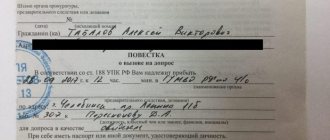Not only a hardened criminal, but also any law-abiding citizen can find himself under interrogation. Especially an entrepreneur who can 101% comply with all laws and pay taxes (for example, due to the fact that he cannot be fully responsible for the integrity of his counterparties), but the attention of the authorities will be drawn to him by a counterparty caught for money laundering or tax evasion.
Alas, during interrogation, many people often do not realize what they are saying and how they are behaving. This greatly facilitates the work of the investigation and spoils the prospects of those being interrogated. How not to worsen your situation and what to say during interrogation?
How do you call in for questioning?
You can be called in for questioning in two ways:
- By telephone message. The investigator calls you, makes sure that Ivanov AA is you (which he will ask you clearly and clearly at least once), and then invites you to the police department at the right time.
- Subpoena. An official document delivered personally to the summoned person/at the place of his registration. For painting. Received means you have been notified. In practice, subpoenas are often sent by simple mail to your place of registration, while formally the investigation considers you notified if, according to Russian Post data, the mail item is listed as “delivered.”
IMPORTANT: You are most likely called as a witness. If you actually committed a crime and were caught red-handed, you will most likely be detained immediately. But the witness is called to communicate, talk, look at behavior and only then ask questions of interest to the investigation.
You must appear both by summons and by telephone message. If you don’t show up by telephone, they will call you with a summons, but the attitude will be somewhat different.
Important conditions for interrogation
Firstly, investigative actions do not allow the use of any illegal measures:
- threats against the person being interrogated (an example would be a promise to deprive one of his freedom and put him in a special cell - the so-called press hut with notorious scum);
- threats that affect the interests of relatives or friends;
- gross psychological influence (pressure) of another kind;
- use of physical violence in any form.
If it turns out that the investigator tried to obtain information through illegal means, he can subsequently be held accountable under Art. 302 of the Criminal Code of the Russian Federation. For blackmail, the investigator himself can be imprisoned under this article (clause 1) for a maximum of 3 years, and for physical influence (torture, bullying) - for a maximum of 8 years (clause 2).
Secondly, all comments should be included in the protocol, even if they seem unnecessary to someone. It is best to make an audio recording without advertising these actions. You do not need to obtain permission from the investigator for such an audio recording, since here you are recording your voice. That is, you just need to conditionally get permission from yourself.
Naturally, it is better even for a witness to appear for questioning accompanied by a lawyer. If you initially appear when called with a lawyer, many questions may disappear by themselves. The defense lawyer will also explain to his client how interrogation techniques have changed in the context of the development of the pandemic.
If you appear without a defender of your rights and interests, and during the interrogation a difficult or clearly unfavorable situation arises for the interrogated person, he has the right to petition for a break in the interrogation. The reason is to ensure the participation of a lawyer. But the investigator may refuse. In this case, you should refer to poor health and state the need to postpone the interrogation to another day. And even then you will be provided with reliable legal protection.
What responsibilities does a witness have?
The witness MUST arrive when called by the investigator. There are a number of valid reasons for non-appearance, such as illness, business trip, etc. Therefore, the investigator will try to call the person for questioning at least twice.
And only then, if the witness categorically refuses to come, a summons may be issued for him, depending on how important the witness’s testimony is for the purposes of the investigation.
And the drive is an unpleasant thing, but effective. A couple of police officers come to you and politely ask you to accompany them. From work, from home, from friends. Unpleasant, to say the least, even without handcuffs. Of course, you can appeal the legality of the arrest - but then, and first you will be taken away in front of everyone. Therefore, it is better to prepare and still show up when called, there will be fewer problems.
Investigators, by the way, immediately try to take action for malicious failure to appear for questioning:
- Why are you not fulfilling the lawful demand of a government representative?
- What an unscrupulous and disrespectful person you are!
- You have something to hide if you don’t want to communicate with us...
And so on. You come in as a witness, but you already feel potentially guilty: unfortunately, this is how the consciousness of a modern person works, for whom “interrogation” and “investigator” are automatically associated with their own guilt and sad consequences !
The witness has the right to come to the interrogation with a lawyer. This is the main rule you should know. If the interrogation begins without a lawyer, but you are asked suspicious or provocative questions, request a break to call a lawyer, giving his full name, number in the register of lawyers and telephone number. This is your absolute right (Article 48 of the Constitution of the Russian Federation), as well as not to agree to a “lawyer by appointment” invited by the investigator.
An application to call a lawyer must be recorded in the interrogation protocol.
What rights of the interrogated person are often violated by the investigator?
- People are not called in for questioning over the phone. But in certain situations, a citizen could confirm in advance with written consent the possibility of a call in this form.
- You have been served with a summons. The investigator knows this because he himself directed her. Then there is no point in avoiding coming to his office at the designated time. But sometimes the investigator may ignore significant circumstances that caused the failure to appear.
- Continuous interrogation for more than 4 hours is a violation of the law. The interrogation must be interrupted for at least 1 hour. During the day, an investigator can interrogate a person in any status for no more than 8 hours.
- At night (after 10 p.m.), investigative actions are usually not carried out. Although there are situations that may be considered urgent. Then the person being interrogated must provide his consent to the night interrogation. The citizen needs to decide whether it is advisable to give such consent. It is very important to take the advice of your lawyer here.
Therefore, it is necessary to ensure that the time indicated in the protocol does not differ from the actual time of the interrogation . If a discrepancy is found, this factor is indicated in the “Comments to the protocol” column.
If the interrogation drags on or goes into the night, you have the right to declare:
- that you feel physically tired;
- that you lose the opportunity to give intelligible testimony;
- If you are used to sleeping at this time, you may confuse something in your testimony.
By the way, the investigator is capable of inciting and moving the clock (applies to the arrested person under investigation). You need to make sure this doesn't happen. You will need to find out the exact time before entering the investigator’s office.
Summoned for questioning - rules of conduct, step-by-step instructions
Follow these rules and you can avoid most common mistakes:
- If you are going to an interrogation with a lawyer, give him personal belongings: apartment keys, car keys, phone, etc. Everything except the passport. Better yet, leave it in the lawyer’s car. You may be detained as a result of interrogation, and everything that is on you will be confiscated, examined, and in the future may form the basis of a criminal case. Why help the investigation so much?
- During interrogation, sit next to the lawyer and refuse to move closer to the investigator. A lawyer, if anything, can correct you or comment on the issue. If the furniture is placed in such a way that you can’t sit next to it, the lawyer (if he is a good and experienced one) will say that “I’ll stand here next to you, it’s okay.”
- To all the investigator’s questions concerning the establishment of your identity or implying as an answer a simple and generally known fact, answer clearly, without excitement and in monosyllables, without unnecessary details. Yes, I am such and such, I was born there, I work/don’t work, I have a family, etc. Nothing extra, these are installation questions.
- You or your lawyer have the right to request an adjournment to deliberate and discuss the position. It is allowed! You need to communicate outside the investigator’s office, in case of hidden audio recording. In the corridor, in the toilet, quietly in your ear - only the lawyer should hear you and no one else.
- You are not forbidden to directly ask the lawyer - “Is this normal?”, “So or not?” and in that spirit, when you are asked a dubious question. The investigator has no right to stop this!
Should we trust the investigator's words?
The first thing you need to realize is that the investigator under no circumstances can be considered an ally of the person being interrogated. Even if the person who appears when called acts as a victim, he still cannot know what tasks the investigator sets for himself. It is quite possible that the defender of the rule of law has some side interests. Therefore, he will try to present the victim as a subject who did not suffer too much or is “to blame”, or is pointing in the wrong direction. And he will make the witness a false witness.
The investigator is not an ally of the person being interrogated, but his dangerous traveling companion. Even if a law enforcement officer confidentially tells a citizen present during an interrogation some information, this does not mean that the information is true. If he claims that he is acting in the interests of the person being interrogated, this cannot be trusted either. The interests of a citizen, and not abstract legality, can only be defended by a lawyer. This is both the direct task of the hired defender and his responsibility.
What to answer?
It is very important to discuss the situation with a lawyer first. Your thoughts - why you were called, and what sins you have that may come back to haunt you in the legal sense of the word. Unfortunately, little is clear before the interrogation and often the summoned person does not even know what exactly will be discussed.
If you don’t know or don’t want to answer, say: “I don’t remember, I can’t remember, I’m not sure I know.” Why is this better than “I won’t answer/I don’t want” and even better than Art. 51 of the Constitution (under which you may not answer at all)? Because you can always “remember” the answer later, having discussed the situation with a lawyer, and no one will accuse you of deliberately hiding something there. Yes, they forgot because of stress and because the events in question took place a long time ago, but at home they thought about it and remembered it. Or they completely forgot :)
Structure and sample agenda
The summons itself is a form filled out by an official. The form indicates:
- date and time, as well as place of interrogation;
- Full name, rank and position of the employee (inquirer, investigator or detective) of law enforcement agencies;
- Full name of the person who is summoned for this interrogation;
- in the role of whom the addressee of this subpoena is called (for example, a suspect, witness, etc.);
- possible liability that may arise for a person in the event of his possible failure to appear at this interrogation.
It may also indicate details of the case itself (for example, the composition of the criminal act in question). But this is not at all necessary, so most often this is not on the agenda form.
Investigators or other police officers, according to current legislation in our country, are not required to provide such information when called.
Pay attention to the sample form of a summons for questioning as a witness.
A little about Art. 51 Constitution
You have the right not to testify either against yourself or against close relatives. This is directly stated in the Constitution.
By taking advantage of the right granted by this article, you may receive a question from the investigator: “Do you think that the answer to this question could harm you or your loved ones?”
You are not obligated to answer, and there is no need to. You have a right - you took advantage of it. Dot!
But there is no point in stating this article in front of a lawyer (if he does not directly advise you to do so). And in general, it is undesirable to use it unless absolutely necessary. Clear necessity: interrogation under obvious pressure, a persistent investigator and without a lawyer. Otherwise, give the lawyer the opportunity to do his job and analyze the situation.
The main task is to understand what the investigation wants from you, where they are digging and what they have on you. And the lawyer must understand this first of all, including by analyzing the questions that the investigation poses to you during the interrogation.
I would also like to say something about conflicts. You shouldn’t idle and without any clear meaning anger people on whom your fate largely depends (at least your status – witness/suspect). There are many legal and safe ways to delay the case and defend your innocence, carefully and “from afar” showing the investigation his mistakes. But with 100% safety for you.
The investigator is your enemy: 10 tips from a lawyer during interrogation
Being summoned for questioning by the competent authorities to testify as a witness or suspect is always stressful, but you need to be prepared for such a situation. When can you not come for questioning? Under what circumstances does an interrogated person have the right to remain silent? How to avoid answering tricky questions? What can be countered to the investigator's tricks? How not to succumb to threats and blackmail? Dmitry Aleksashin, a former employee of the Investigation Department of the Ministry of Internal Affairs, lawyer, partner of the PASMI Legal Center, answers these and other questions.
The main thing you need to know when you are called in for questioning is that the investigator is not your ally. The exception is if you are a victim in a criminal case. Law enforcement officials have their own goals and objectives, often very different from yours. You should not trust information from the investigator; it may be unreliable even if he says that he is acting in your interests. Only a lawyer acts in your interests.
Conventionally, the interrogation of an investigator can be divided into three stages: preparatory (summoning for interrogation), main (interrogation itself) and final (reading and signing the protocol).
Tip one: tell your employer
As soon as you learn that a law enforcement officer intends to obtain a statement from you, inform your employer. If you work for a small company, you need to take care of a lawyer yourself.
Tip two - come according to the agenda
A witness or suspect is summoned for questioning using a subpoena. The summons is served either personally on the summoned person or sent to him by mail. If a person fails to appear without a good reason, the investigator has the right to forcefully bring him in.
Notify the investigator in advance of your inability to appear for questioning and ask to reschedule the date or time of questioning. If you can confirm the validity of the reason for a witness’s failure to appear for questioning, support this with relevant documents. For example, a medical certificate in case of illness, or air tickets if you were not in Russia on the date of interrogation by the investigator.
Illness or business trip are grounds for failure to appear for questioning by the investigator. The impossibility of appearing must be notified by a petition or telegram. As a last resort, call. But the conversation must be recorded.
Tip three - do not refuse a lawyer
If you are called in for questioning, avoid any communication with the investigator without the approval of your lawyer. Any negotiations with the investigator, including by exchanging messages using Internet messengers, by email or telephone, are best carried out with the knowledge of the lawyer.
You should not attend a witness examination without a lawyer. During the interrogation, the lawyer has the right to give you brief advice of both a legal and tactical nature. In addition, the lawyer will ensure that your rights are not violated during the interrogation.
By appearing for questioning by an investigator without a lawyer, you are leaving yourself without qualified legal assistance in a situation where legally trained law enforcement officers are playing against you.
The right to have a lawyer when questioning a witness is provided for by the criminal procedure law. It is advisable that a lawyer be present initially. However, at any time you can request a break in the interrogation in order to ensure the participation of a lawyer. If the investigator does not satisfy this request, the interrogation of the witness can be postponed, citing poor health.
Tip four - prepare a written position
It is necessary to prepare for the interrogation of the investigator. If you are summoned for questioning, it is necessary to find out the reason for the summons for investigative action. It is necessary to analyze the situation in detail and develop a written position with the participation of a lawyer to answer possible questions from the investigator.
The interrogation of a witness is carried out in order to clarify circumstances relevant to the criminal case. However, we must remember that the investigator independently determines during the interrogation what information is important. During the interrogation, the investigator has the right to ask questions at his own discretion. The witness must be prepared for a wide range of questions that the investigator may ask, not limited to the circumstances of the criminal case under investigation.
Tip five - don’t take anything unnecessary with you
Remember: in order to obtain evidence in a criminal case, the investigator has the right, before, during, or after the interrogation of a witness or suspect, to seize objects or documents that the witness has with him. When interviewed by an investigator, take with you only those items and documents whose seizure does not pose any risks. If you do have such items and documents with you, hand them over to your lawyer before communicating with the investigator.
Tip six - remember the right to refuse to testify
Before the interrogation begins, the investigator explains to the interrogated the rights and obligations. You should pay attention to Art. 51 of the Constitution of the Russian Federation, which enshrines the right of the interrogated person not to testify against himself and his close relatives, the circle of whom is determined by law. Thus, any person, on the specified grounds, has the right to refuse to give testimony (explanation).
The use of this constitutional norm does not indicate that the interrogated person is hiding any circumstances, and cannot be considered as evidence of his guilt. The use of one's constitutional rights cannot worsen the situation of the person being interrogated. A person may submit a request for additional questioning at any time.
Before the start of the interrogation, the investigator warns the witness about criminal liability for refusal to testify (Article 308 of the Criminal Code of the Russian Federation) and giving knowingly false testimony (Article 307 of the Criminal Code of the Russian Federation). The witness may be subject to such liability in the future.
You should not tell the investigator that you refuse to testify. However, if the situation is not clear to you, the answer to the question cannot be given without preparation and may entail risks for you or close relatives, it is better not to testify, referring to Article 51 of the Constitution.
Tip seven - answer briefly and to the point
When interrogating an investigator, do not be afraid to clarify questions and answer only the question posed. Listen carefully to the investigator's questions. Make sure you understand the question. Do not hesitate to ask again and ask for clarification of the question if you do not understand something, or if the question seems too general or abstract to you. Always try to remain calm and have a clear assessment of what is happening.
If the investigator asks you to state the circumstances of interest to him in free form, answer briefly and concisely. Do not express assumptions or opinions; in your answers, refer only to facts. Analyze every word you say based on possible risks.
During the investigative action, the interrogated person has the right to use the documents and records available to him. You can use a draft of your position during the interrogation of a witness, explaining to the investigator that in this way you will more accurately reproduce past events.
Ideally, your testimony should be set out verbatim in the protocol of the investigative action, and the investigator will act as the person who will record the position prepared in advance. Remember, if you were not asked something and you did not answer something, this does not mean that you lied.
Tip eight - don’t be afraid to answer “I don’t remember”
When interrogated by an investigator, do not hesitate to answer questions “I don’t remember.” This is especially true for “slippery” topics, as well as those questions that you are not ready to answer right now. This will allow you to gain time and prepare for the correct answer. It is the investigator's responsibility to ask questions and think them through in advance.
Tip nine - study the protocol
Do not allow the investigator to arbitrarily interpret your words. Carefully study the witness interview protocol before signing it. Everything should be stated exactly as you said, in the same wording.
If something is missing or you want to add something, then request changes to the protocol before signing. If the investigator refuses to make them, write the additions in your own hand at the end of the protocol - in the column “Comments to the protocol.”
Tip ten - don’t rush to sign
Never sign an interrogation report without reading it. During the interrogation of the investigator, the witness has the right to read the protocol; to confirm the correctness of the testimony stated in the protocol, the witness signs each sheet of the protocol.
Even if the investigator assures you that everything in the interrogation protocol is written down from your words, even if you are in a hurry, even if you are urged on and demanded to sign the protocol as quickly as possible (especially in this case), do not sign it without reading it. Remember that the record of interrogation of a witness is evidence in a criminal case. Anything you say during interrogation can be used to accuse you or someone else of a crime.
Always ask for a copy of the interview report as a witness. The investigator is not obliged to give it, but has the right, and you can ask for it. Before signing the protocol, you have the right to rewrite the text of your interrogation in your own hand.
What does the investigator not have the right to do?
The law does not provide for summons for questioning by telephone. The only exception is if you have given written consent to this in advance. If the investigator claims that a subpoena was sent to you, it is better not to avoid appearing for questioning.
The interrogation cannot last continuously for more than 4 hours . The interrogation may be continued after a break of at least one hour. The total duration of interrogation should not exceed 8 hours during the day.
Carrying out investigative actions at night ( after 10 p.m. ) is possible only in urgent cases. However, continuation of interrogation at night is possible with the consent of the person being interrogated. Before giving such consent to the investigator, analyze the appropriateness of this action.
Carefully ensure that the time indicated in the interrogation protocol corresponds to the actual time of interrogation. If there is any discrepancy, please indicate this in the “comments” column. When interrogated at night or for an interrogation lasting more than 8 hours, use the following formulations: “I am tired, I cannot testify at night,” “The duration of my interrogation is more than 8 hours, I am tired, I cannot give further testimony.”
Remember: the use of violence, threats and other illegal measures is unacceptable during investigative actions. The investigator may be held criminally liable for forcing a witness to testify (Article 302 of the Criminal Code of the Russian Federation). During the interrogation, the investigator does not have the right to threaten the witness (including with imprisonment).
Always make comments in the interrogation protocol and keep an undisclosed audio recording.
If you need qualified assistance from lawyers, please contact the PASMI Legal Center (write, call - 8 (495) 998-20-40.
If you have information about corruption violations by officials and law enforcement officers, write to the PASMI section “Report Corruption.”








